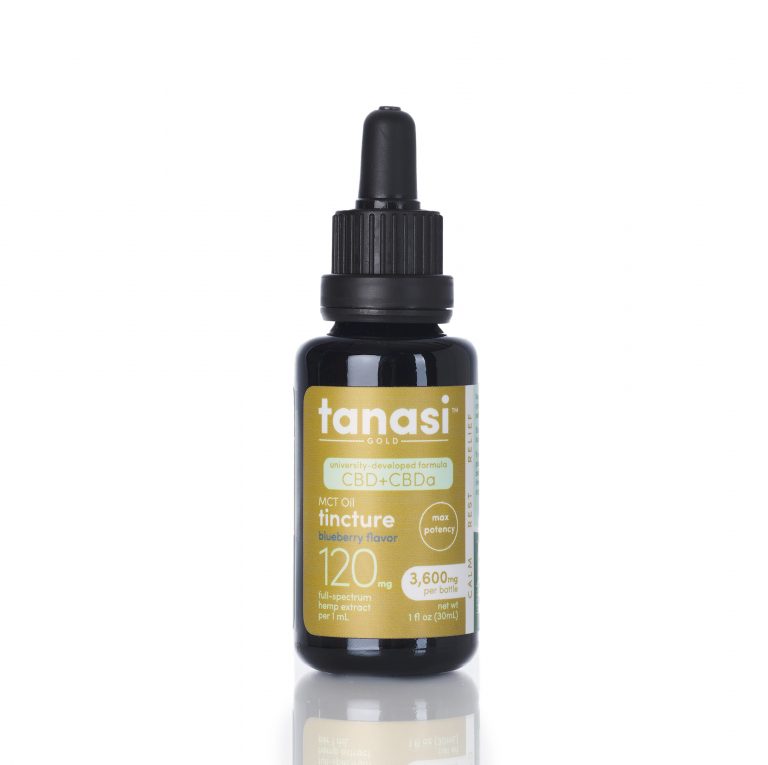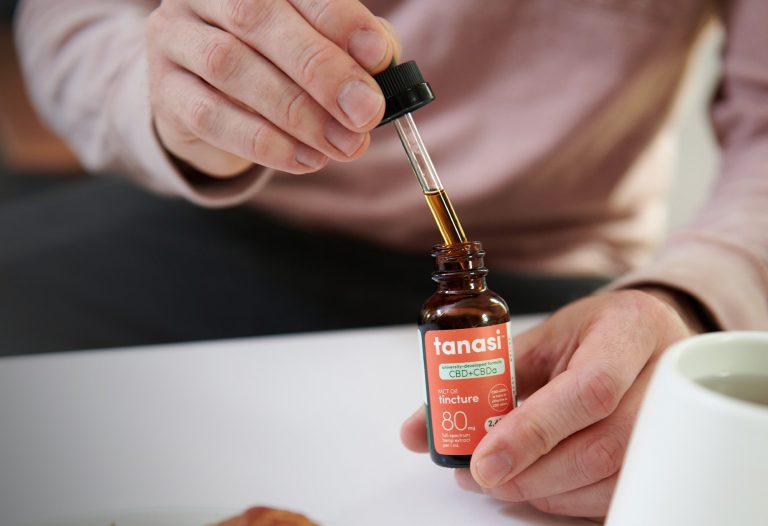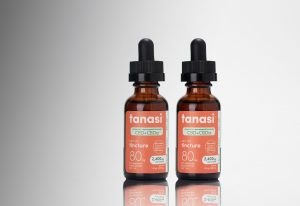Can the MCT Oil in Tanasi Products Cause Stomach Pain?
Posted on March 9th, 2023
Here at Tanasi, we use MCT oil as a carrier oil for our CBD and CBDa products, containing a patent-pending, 1:1 formulation of those two active ingredients. (Research shows that, in combination, they’re 2x more effective than CBD alone, as you can see by reading our findings.)
Now, if you have ever taken large amounts of MCT oil, then you know that ingesting this substance may lead to stomach discomfort or pain. At the same time, MCTs (Medium Chain Triglycerides), are a type of fat that has also received a lot of health accolades in recent years for the properties that make them quite different from other types of fats. (For reference, MCTs are most prevalent in coconut oil. But they can be found in other natural sources, as well.)
With all the mixed information about MCT oil, we understand why you may be hesitant to ingest this substance. For that reason, we want to give you more information about why we choose to use this substance in Tanasi products. Then, we’ll share more information about MCT oil stomach pain, and what you can do to avoid this unwanted, side effect.
 What Is MCT Oil?
What Is MCT Oil?
MCT oil is a saturated fat that is made by processing kernel palm oil and coconut oil. It is important to note that you should not confuse coconut oil with MCT oil. This is because the former is made up of both MCTs and LCTs (Long Chain Triglycerides) while the latter is mainly composed of MCTs, with a low composition of LCTs, if any. MCTs are also present in a number of dairy products, albeit in lower concentrations.
The main difference between MCTs and other fats is they are quickly absorbed into the bloodstream. Then, they move through the small intestines for transport to the liver before breaking down into ketones. Unlike LCTs, medium-chain triglycerides are shorter in length. They can, therefore, make their way along the digestive tract without triggering the release of digestive enzymes from the stomach, pancreas, or gall bladder.
MCT oil is mainly made up of capric and caprylic MCTs. However, there are four types of MCTs in total.
Why Do People Take MCT Oil?
There are many reasons why people add MCT oil to their diet, with some of the main experiences described as being:
Making You Feel Fuller for Longer
MCTs are known to reduce the production of leptin, an important hunger hormone. This means that they may make you feel fuller for longer, possibly helping you reduce your food consumption levels.
Burning Fat and Calories
Since MCTs are rapidly absorbed into the body and converted into ketones, a source of energy, they may enhance the rate at which the body burns fat instead of storing it away. Ketones can cross the blood-brain barrier effortlessly, making them a great source of energy for the brain.
Weight Loss
Consuming MCTs may help you achieve your weight loss goals in a number of ways. For starters, using MCTs could help the body burn more fats instead of storing them away. Furthermore, consuming MCTs may help keep you fuller for longer, thus reducing your chances of snacking unhealthily. The energy supplied by the ketones from the breakdown of fat may also help you power through workout sessions.
Dieting
MCT oil is considered to be a major part of the Ketogenic diet. This is due to the fact that the body shifts to burning fats for energy, ketones when your diet contains very low amounts of carbohydrates.
MCT Oil and Stomach Pain
Now that you know what MCT oil is, you are ready to dive into one of its most common side effects: stomach pain or discomfort.
MCT oil may cause stomach pain when consumed in large amounts. Those who are new to the use of this supplement may also suffer the same effect. Some people consider this to be a small price to pay for the many upsides of using this supplement. However, it is important to have an idea of why this occurs in the first place; and if possible, how to prevent it from happening.
To understand why MCT oil causes stomach pain, you will need to understand how other fats are digested and absorbed into the body. Regular fats, or LCTs, usually follow a long and drawn-out process before they are ready to be broken down into ketones. When ingested, LCTs trigger the release of various digestive enzymes as they make their way through the digestive tract. These digestive juices, produced by various organs including the gall bladder and pancreas, play a huge role in the emulsification, or breakdown, of long-chain fats.
LCTs vs MCTs
Unlike LCTs, MCTs are directly absorbed into the bloodstream in the small intestines without the need for any digestive processes. In fact, MCTs do not trigger the release of digestive enzymes along the digestive tract. This is something that the body is used to when dealing with ingested fats. The absence of a digestive process during the absorption of MCTs may cause stomach pain or cramps.
This pain, or cramping, can be worse when you consume MCT oil on an empty stomach. As previously stated, consuming abnormally high doses of MCT oil is also bound to cause stomach pain as the shock to the digestive system is more pronounced. Thankfully, you won’t have to worry about this effect when you consume Tanasi’s CBD and CBDa products, as they contain minimal amounts of MCTs.
 How to Avoid MCT Oil Stomach Pain
How to Avoid MCT Oil Stomach Pain
At this point, it is clear to see just how the consumption of MCT oil can lead to stomach aches. However, you need not resign yourself to suffering this unwanted effect just to get the associated benefits. In fact, you will be happy to know that there are things you can do to avoid any stomach discomfort every time you ingest MCT oil.
It is recommended that you avoid ingesting this supplement on an empty stomach. This may help prevent triggering a passive digestive process and the resulting stomach pain whenever you consume MCT oil.
Adding MCT oil to smoothies, salads, or other types of food, before you eat will help prevent the occurrence of a passive digestive process. Even though the MCT oil will still be absorbed rapidly into the bloodstream, this process will be slowed by the digestive process triggered by the consumption of regular food. The release of all the necessary digestive enzymes will be triggered as the food containing the MCT oil makes its way along the digestive tract.
It is important to remember that MCT oil has a low burning point. Therefore, it should not be used to fry food.
MCT Oil Dosage Instructions
As previously mentioned, consuming too much MCT oil can cause stomach pain or discomfort. More importantly, as a saturated fat, MCT oil may lead to an increase in cholesterol and/or weight gain. This is more common when consumed in large doses for an extended period.
One of the best ways for you to know how much MCT oil is right for you when starting out is to pay close attention to how your body reacts after each dose. Start with a low dosage amount and then increase it gradually, as you speak with your doctor about any major changes in your health routine.
Conclusion
The use of MCT oil is growing in popularity as more and more people learn about its potential benefits. It’s true, the use of this supplement does not cause any severe side effects. However, most new users normally experience stomach pain after consuming MCT oil.
Fortunately, you can avoid any cases of stomach discomfort by following the above-mentioned tips on the consumption of MCT oil. Avoid ingesting MCT oil on an empty stomach, and always ensure that you do not exceed the recommended dosage amount.
Last but not least, be sure to consult your physician before you add MCT oil to your diet.

Related Posts in MCT Oil

May 3 2023
Does MCT Oil Go Bad? How To Maximize Freshness and Identify Bad Oil
Read More →
Apr 13 2023
When Is the Best Time to Take MCT Oil with CBD + CBDa?
Read More →
Apr 7 2023
8 MCT Oil Effects: Why Tanasi Chooses This Carrier Oil
Read More →
Mar 21 2023
 What Is MCT Oil?
What Is MCT Oil? How to Avoid MCT Oil Stomach Pain
How to Avoid MCT Oil Stomach Pain 